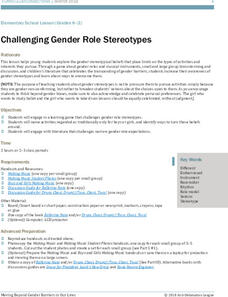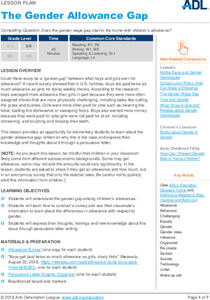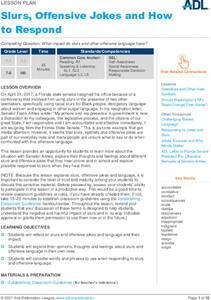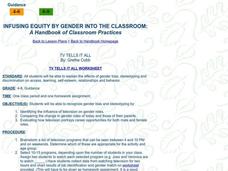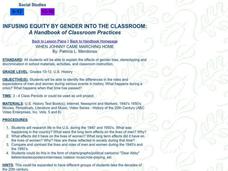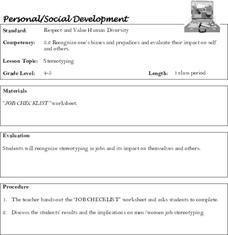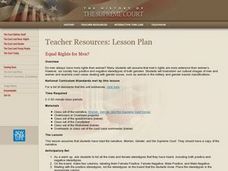Learning for Justice
Showing Empathy
A short social-emotional learning lesson teaches high schoolers how to show empathy toward others. After completing a short survey that has them assess their understanding of empathy, the class learns specific behaviors they can model to...
Learning for Justice
Cliques in Schools
Band geeks, jocks, preppies; every school has its groups. Middle and high schoolers identify the various friendship groups and cliques in their school and consider these groups' positive and negative traits. After completing a Clique...
Anti-Defamation League
Don't Let Hate Ruin the Fun: Youth and Online Games
Gamers unite! Take action against bullying and hate speech in online video games! After reading data that reveals the extent to which various age groups experience hate and, or harassment while playing video games online, groups develop...
Anti-Defamation League
Role Models and Stereotypes: Misty Copeland's Story
A lesson points the spotlight at Misty Copeland, the first African American Principal Dancer. A thoughtful discussion prompts pupils to think of their career aspirations and identify ways role models and stereotypes influence young...
Curated OER
"The Story of an Hour" Lesson 1: Teacher's Guide and Notes
Attitudes toward women have changed radically in the last hundred years. The first lesson in a six-part unit that uses Kate Chopin's short story "The Story of an Hour" as an anchor text begins with a shared reading of "The Role of Women...
Anti-Defamation League
Should Washington's NFL Team Change Their Name?
"What's in a name?" Is it irrelevant, as Juliet suggests in Shakespeare's play, or is nomenclature deeply significant? Young scholars weigh in on the debate by examining the controversy over the NFL's Washington, D.C. Redskins. Groups...
K20 LEARN
You Think You Have Problems: Perspective in Multi-Genre Literature
Young scholars are asked to reflect on how personal experiences might influence points of view and perspectives. They read poems and biographies of the poets and then match the poem to the poet. To justify their matches, learners...
Anti-Defamation League
Challenging Gender Role Stereotypes
Through thoughtful discussion and a read-aloud, scholars challenge gender role stereotypes. Pupils examine pictures and collaborate with their small groups to debunk stereotypes. They explain what gender role stereotypes they know of and...
Anti-Defamation League
The Gender Allowance Gap
Does the pay gap begin with allowance? That is the big question scholars answer in a lesson examining how gender affects how much money an individual earns. Class members conduct a survey to identify how the allowance is paid, take their...
Anti-Defamation League
What "Draw-A-Scientist" Reveals about Gender Stereotypes
What do you picture when you hear the word scientist? Challenge scholars to put pencil to paper, draw a scientist, and then reflect on the patterns they observe. Learners read an article about a female scientist and write a story about a...
Anti-Defamation League
Intent vs. Impact: Why Does it Matter?
Contrary to the popular saying, words can hurt. Words matter! Tweens and teens can reflect on how words impact others even if the intent wasn't how the words were perceived. After examining an Instagram post where Lizzo apologized for...
Anti-Defamation League
What are Reparations and Should We Enact Them?
Young social scientists investigate recent legislative proposals for reparations for African Americans. They examine the rationale behind the proposals by viewing videos and reading related articles. To close the lesson, scholars craft a...
Anti-Defamation League
Slurs, Offensive Jokes and How to Respond
How to respond to slurs and offensive jokes is the topic of a lesson designed for middle and high schoolers. After journaling about their experiences with slurs and nasty jokes, participants read an article about a Florida State Senator...
Curated OER
Cultural Issues
Young scholars observe another culture using a provided simulation script and then make assumptions about that culture based on what they witnessed. They will later be debriefed and talk about the assumptions they made that were not...
Curated OER
Without Limits
Seventh graders research about the important contributions of two scientists they chose from the list. In this science lesson, 7th graders develop a creative presentation such as skits or news program about their research. They present...
Curated OER
TV TELLS IT ALL
Students identify the influence of television on gender roles and talk about how they are changing.
Curated OER
WHEN JOHNNY CAME MARCHING HOME
Students examine the roles of men and women throughout history.
Curated OER
Stereotyping
Students study how stereotyping in jobs impacts themselves and others. They complete a worksheet about the implications of stereotyping and discuss it.
Curated OER
What's on the Outside/Inside?
Students read about the idea of gender perspective in the writing of German history. They generate definitions from a list of given vocabulary words. They write definintions using their own words.
Curated OER
The President's Day Has Arrived
Students state and defend their opinions regarding all aspects of the impeachment proceedings against President Clinton after completing a survey and researching the topic. They also consider opinion polls, media bias and global politics.
Curated OER
Using Primary Sources
Young scholars examine primary source documents about slavery in the United States. They evaluate the documents for the evidence they provide, reliability and bias. They present their evaluation to the class.
Curated OER
Equal Rights for Men?
Study the issue of gender bias in court cases with a resource that ponders the extent of gender equality. Learners examine cultural images of men and women and examine court cases dealing issues such as women in the military.
Curated OER
Frederick Douglas and Abraham Lincoln
Students discuss the significance of the announcement of the Emancipation Proclamation and the assassination of Lincoln. They analyze how historians use evidence and develop differing interpretations. Students examine historical bias and...
Curated OER
History and Human Rights: A Process for Analyzing Events
Students analyze various American History topics which concern human rights. They research the topics and analyze the sources for bias or stereotype. They decide and discuss whether or not any human right were violated in each...
Other popular searches
- Biased or Unbiased Sample
- Biased Persuasive Text
- Biased Samples
- Biased Survey
- Biased or Unbiased
- Biased Data
- Biased and Unbiased
- Biased Reporting
- Biased Language
- Gender Biased Computer Games
- Biased Question
- Random and Biased Samples









